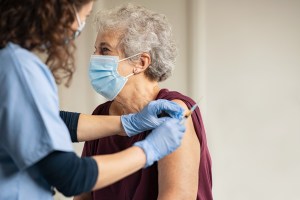
To mark World Alzheimer’s Day – which is 21 September – dementia experts from around the globe are calling for dementia care after diagnosis to be recognised as a human right.
The call comes in response to new data that shows up to 85 per cent of the over 55 million people living with dementia worldwide may not be receiving adequate post-diagnosis care, treatment or support.
While there is a lot of attention in the dementia space directed at prevention and cure, post-diagnosis care tends to take a back seat, said Professor Henry Brodaty from UNSW Sydney’s Centre for Healthy Brain Ageing. “The time after diagnosis is particularly difficult for the person living with dementia – and their family. Post-diagnosis care must be recognised as a human right.”

Alzheimer’s Disease International – a global federation of 105 Alzheimer and dementia associations – has released the World Alzheimer’s Report 2022 which highlights the urgent need for post-diagnosis dementia care.
“In the same way that people who have had a stroke or heart surgery are offered rehabilitation and continued support, people diagnosed with dementia deserve the opportunity to live positively, build on their assets and compensate for their disabilities using a reablement framework,” said Professor Brodaty, who co-founded the ADI and co-authored the report.
Post-diagnosis dementia care refers to multiple interventions that can improve the quality of life for those living with dementia, including:
- pharmacological and non-pharmacological treatments
- rehabilitation
- brain training
- cognitive stimulation therapy
- lifestyle interventions – especially physical exercise
- home adaptations
- social inclusion
- caregiver support
- respite.

Along with Professor Brodaty, Professor Perminder Sachdev is co-director of CHeBA. He said there needs to be a care continuum, from the moment of diagnosis to end of life.
“Several good models of care are available. What we need is their proper implementation, and adaption to low resource settings when necessary.” The role of government in bringing this about was “paramount” added Professor Sachdev.
ADI CEO Professor Paola Barbarino agrees. Governments must invest in training and support services she said. “Globally, clinicians are both under-educated on dementia and under-resourced to provide adequate post-diagnosis care for people living with dementia. It’s up to governments to shore up their healthcare systems so that it’s possible for healthcare professionals to provide quality care that people living with dementia desperately need,” she said.

CHeBA recommends the first step the Australian Government can take is to commit to providing a trained navigator or key worker to act as liaison and support for people newly diagnosed with dementia to enable them to connect and engage with vital supports and services.
“It greatly improves the quality of life for a person with dementia if they have clear access to health resources, care, information, advice, support and, importantly, life adaptations and adjustments,” said Professor Barbarino. “Ensuring these navigators can act as a single point of contact for people living with dementia could be the key to helping navigate this incredibly complex journey.”
Dismantling discrimination
To align with World Alzheimer’s Day, 19-25 September is Dementia Action Week in Australia. To mark the event – developed by Dementia Australia in consultation with people living with dementia – the organisation has released a 24-page report, Dismantling dementia discrimination.

“Dementia is largely an invisible disability and what people can’t see they don’t understand and what they don’t understand they tend to avoid,” said Dementia Australia CEO Maree McCabe.
Australian and international studies show that stigma and discrimination surrounding dementia can discourage people from seeking healthcare, including a diagnosis, and reduce social engagement with family, friends and the wider community.
A 2021 survey conducted by Dementia Australia found 64 per cent of respondents who live with someone with dementia believe discrimination towards people with dementia is common or very common. Meanwhile, 87 per cent of people living with dementia surveyed felt patronised by people and said they were treated as if they were stupid.
The community needs to be better informed about dementia so that people can better support individual’s living with the disease said Ms McCabe. “Dismantling dementia-related stigma and discrimination requires a collective effort.”
Among the practical things people can do for those living with dementia include:
- adapting the lighting and signage within a physical space so it’s easier to navigate
- adapting environments so that they are less noisy
- introducing yourself each time you meet someone with dementia, even if you’ve known them for a long time
- checking in on someone with dementia, especially if they’ve distanced themselves from support services or community group.
Bobby Redman is chair of the Dementia Australia Advisory Committee. “As a person living with dementia, I urge that healthcare professionals and the general community recognise that a little support makes a big difference.”
A dementia diagnosis doesn’t stop people participating in a meaningful way within their communities said Ms Redman. “Once people realise that a purposeful life can continue after diagnosis, the stigma will be lifted and the fear reduced.”
Comment on the story below. Follow Australian Ageing Agenda on Facebook, X (Twitter) and LinkedIn, sign up to our twice-weekly newsletter and subscribe to AAA magazine for the complete aged care picture.



